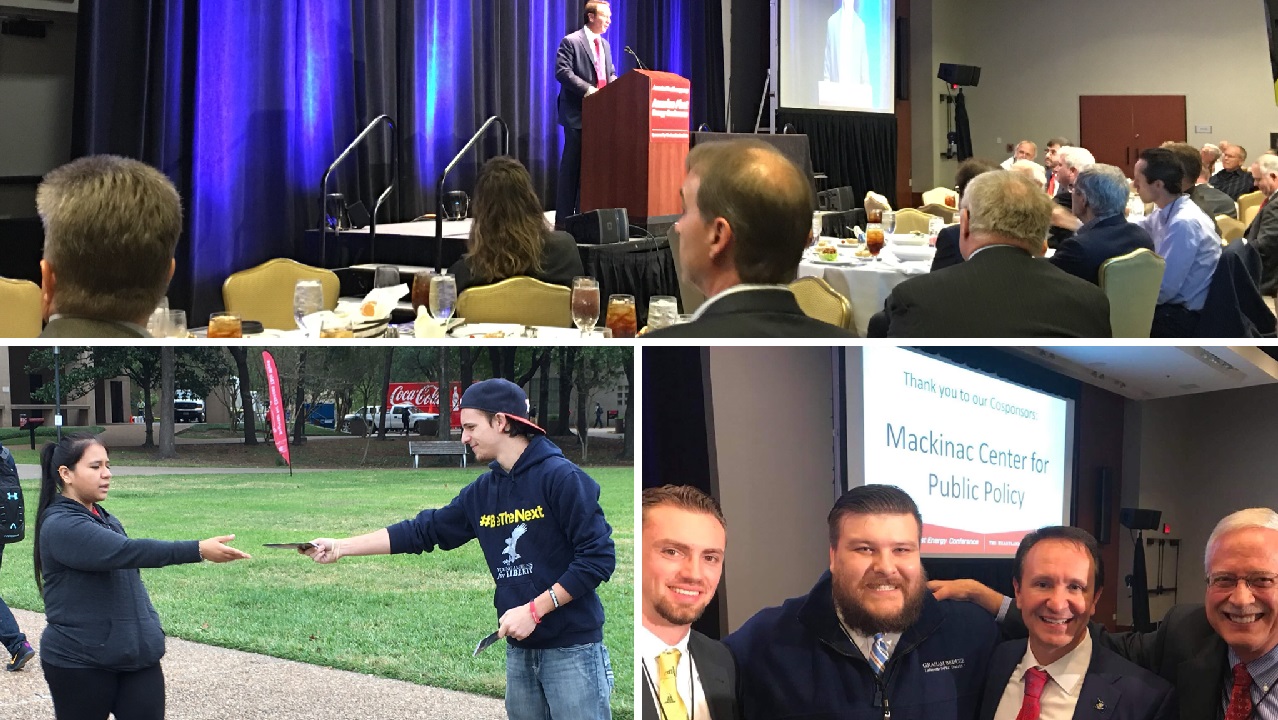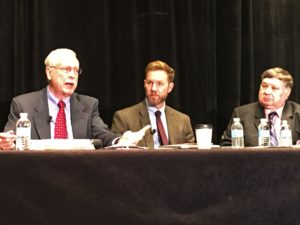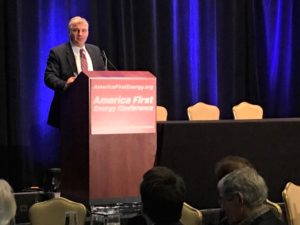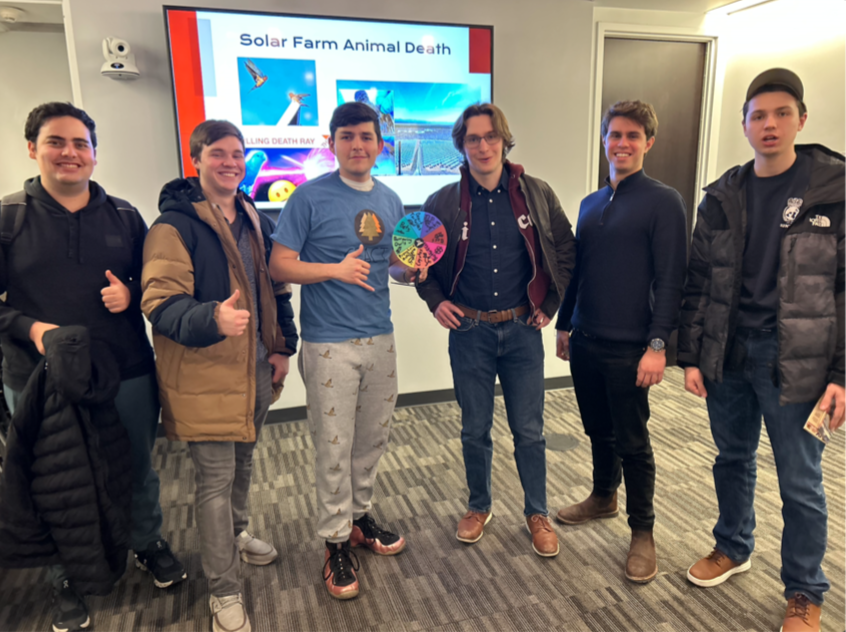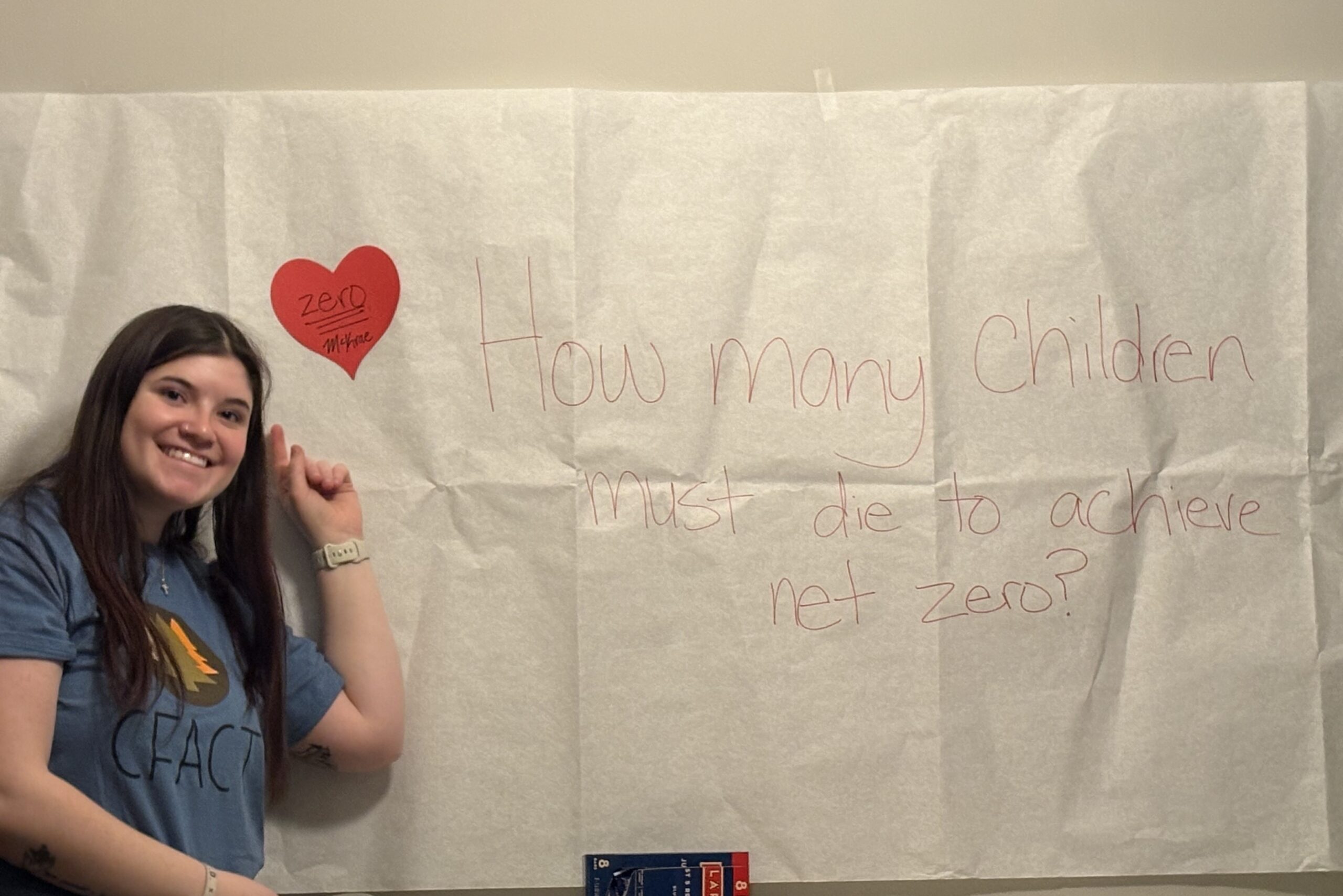With the election of President Trump, there was a clear mandate from the American people to end the infamous Obama “War on Coal.” States like West Virginia, Pennsylvania, Ohio, Michigan and Wisconsin turned red for Trump because of his promise to put “America First,” both in energy production and manufacturing. In this light, CFACT participated in the Heartland Institute’s “America First Energy Conference,” in Houston, Texas, to develop a strategy to most effectively unleash our country’s potential for not just energy independence, but energy dominance.
CFACT was engaged at every level, participating in panels on energy policy, discussing issues with scientists and Trump administration officials, and even took to the University of Houston to engage with the student body.
CFACT senior policy adviser Paul Driessen appeared on multiple panels, explaining the in depth numbers behind so-called renewable energy and fossil fuels. Driessen explained how in order to replace 25 billion megawatt-hours of global electricity consumption, the world would need at least 100 million 400 foot tall wind turbines. This would require 1.5 billion acres, which would cover 80% of the lower 48 states in America.

Toxic sludge waste is poured out from a rare Earth metals mining facility.
Driessen then exposed the dirty secrets behind the mining in third world countries for “rare Earth metals,” which are necessary for wind and solar. “They are mining these materials under horrific, unsafe conditions. Inhuman even, that few of us have seen and few can even imagine. Our technology slave laborers earn a few pennies or dollars per day while risking cave ins and being exposed constantly to filthy, toxic radioactive mud, dust, water and air. Bottom line: Clean renewable energy is definitely not clean, renewable, eco-friendly, healthy or sustainable.”

UH student Mike Anderson hands out flyers on “Real Energy.”
Driessen continued by saying “[these processes are] taking place in somebody’s else’s backyard. Affecting somebody’s else parents and children far away from us. But that doesn’t mean the damage isn’t being inflicted, and it doesn’t make it right, moral, or ethical.”
But just talking about these issues wasn’t enough for CFACT. CFACT leaders and collegians took these ideas and put them into action by performing activism at the University of Houston with local students and engaging with them on these issues. The team of CFACT staff and students distributed flyers that advocated for “Real Energy NOT Green Energy!” and explained how fossil fuels and nuclear are needed to power our country and lift the third world out of poverty.
“It was great reaching out to students on campus regarding energy issues and how the free market is the best option to help our environment,” said UH senior Mike Anderson. Some students gave the flyers funny looks, since it obviously went against the leftist talking points they have heard for almost their entire lives. But others were receptive, and several students signed up to learn more and get involved.
Back at the conference, Louisiana Attorney General and former congressman Jeff Landry was one of the keynote speakers. Landry is most known for holding up a sign during a formal jobs

Louisiana Attorney General and former Congressman Jeff Landry addresses conference attendees.
address to Congress from President Obama that read “Drilling = Jobs.” President Obama was none too pleased.
“There is no industry like the energy industry that does more to help the lower and middle class,” Landry explained. “53% of our refining capacity is on the Gulf Coast.” The Attorney General stated his support for Donald Trump’s energy dominance agenda, and pledged to do everything in his power to continue to unleash that potential in Louisiana.
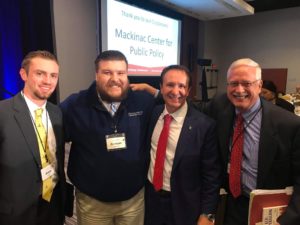
CFACT staff poses with Jeff Landry after discussing the issues he addressed during his talk.
CFACT’s National Director of Collegians Adam Houser and Southern Regional Director Graham Beduze had the opportunity to discuss the issues with several prominent individuals at the conference. This included Attorney General Landry himself, Myron Ebell, head of Trump’s EPA transition team, and Dr. David Legates, the professor from the University of Delaware that debunked the so-called climate change “97% consensus.” Through his research, Legates looked intensively at climate change papers, and found the “consensus” number was closer to 0.3%!
To finish the conference, Vincent DeVito, the senior counselor for energy affairs at the Department of Interior, discussed the President’s agenda for energy development. “The war on American energy is completely over,” he declared to thunderous applause from those in attendance.
From a more technical standpoint, DeVito explained that the Department is working hard to fix the stalling, delaying and ignoring of energy projects that are buried under mountains of paperwork. While Obama and his administration may have made headlines with strong regulations against offshore drilling and the coal industry, possibly just as harmful was the regulatory and bureaucratic stonewalling of energy development behind the scenes.
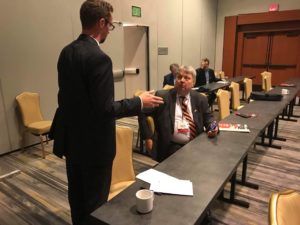
CFACT National Director of Collegians Adam Houser discusses the so-called “97% consensus” with Dr. David Legates.
Many projects just were never looked at or have been stymied by a reviewing process that never seemed to end. DeVito signaled a different strategy for this administration. According to DeVito, the Department of Interior is the second largest generator of revenue for the government, behind only the IRS. This is due to the revenue on the massive amount of energy resources under the Department’s authority.
“Why they created this office in the first place is that these resources are not the government’s resources, it’s the taxpayer’s resources. Our job is to make sure that the taxpayer receives value for their energy resources.” DeVito went on: “Energy produced in the USA is more environmentally friendly than anywhere else in the world.” DeVito explained the United States should be the one to develop it and become an energy exporter, because we know how to do it most efficiently, with the best environmental protections.
From Driessen to Landry a common theme that the speakers struck was emphasizing that when you get rid of barriers to energy development you’re not just making rich people richer. You’re reducing energy prices for everyone, especially the elderly who struggle to heat their homes in the winter on fixed incomes, or the family struggling to make ends meet. If America is able to help struggling families save even just a couple hundred dollars a year on gasoline, electricity or heat, that could make a huge difference in their lives. You can watch every session and speech here.
The future is bright for American energy dominance. Trump administration officials are optimistic and working hard to undue Obama era regulations on energy development on coal, nuclear, natural gas and offshore drilling. Students were receptive to CFACT’s pro-energy message at the University of Houston. As Trump officials begin to unlock the shackles placed on the energy industry, jobs, prosperity and development will follow, and CFACT will continue to take this message to the upcoming generation and beyond.
